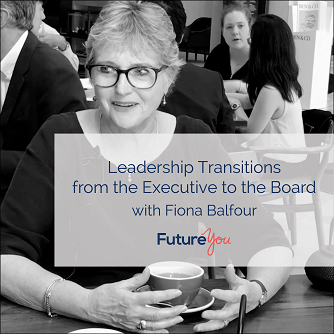Emily Wilson recently caught up with Fiona Balfour
a respected, independent Non-Executive Director, who's spent years on boards with Metcash, The Red Cross, TAL Life and the National Breast Cancer Foundation… amongst many others. Fiona moved to boards after 14 years with QANTAS as their CIO, which got Emily to thinking; these are very different roles...
What does this leadership transition from operations to governance look like?
Fiona: So the transition took a little while. It's not a... it's not a natural transition. I think it took me first three or four years to really become as competent, or as proficient as a director as I had been as an executive.
Emily: You deliberately continued growing, learning...
Fiona: Absolutely, yeah, you have to. They're very different skills.
As an executive, if there's a problem, to solve, you go get your resources, your people, your project plan and you go execute. If there's a problem to solve as a director you can't do so much, other than guide, warn, encourage... One of the few things you can do as a director is go get a new Chief Executive.
But I mean, that's the NUCLEAR option and... It's not the first thing you should do it's the last thing you should do.
So, I joined the board of a charity, National Breast Cancer Foundation. I'd been a nominee on a company that Qantas had a significant shareholding in. So, I was learning there and I was learning at the Breast Cancer Foundation. I joined the board of my son's school, doing more learning there, and then I went and did the Company Directors' course at the Institute of Company Directors.
Emily: And did you find that useful?
Fiona: If you've come out of a listed, big company environment as I had with Qantas, it wraps a context around it. But yeah, I found that fun and useful. So, I went and did that, and then started speaking with people and let people know that I was available for board work.
Emily: Fiona often talks about 'doing your best', which is absolutely key - Applying yourself is the trait of a really strong leader.
Fiona: The very best days in your professional life are always as an executive.
Emily: Okay, why?
Fiona: Oh, because you've done it. You've executed it. Your team's done it... You've been part of a very big team. They're joyous experiences; they're really great, and months of work goes into it and it's really, really satisfying.
The worst days as a director are probably the worst days of your whole career.
You know, if something's just gone so horribly wrong, you have to make an announcement to the stock exchange, or, you know, there's been some horrible issue that you have to deal with by removing someone from the business.
I think the further up the governance structure and the organisation you go, the intensity changes at each level. But, you know, I enjoy being a director now. I'm in a team of 5 now, I'm not leading a gang of 200 people or a thousand people. So, by definition, the emotional reward is at a different scale. It's just, it's as simple as that.
Emily: From our conversation, the key things are around integrity and accountability and how these two traits are key to leadership. So, if there is truth in the saying 'lead by example' then I can't think of a better example than Fiona.
Related Videos:
Watch Part 2: It just takes a bit of bad feedback!' Fiona Balfour on EQ
Watch Part 3: The evolution of personal values with Fiona Balfour
Watch Part 4: Even if you have to quit... Integrity, with Fiona Balfour









